Dear Zazie, Hope you had a good Thanksgivin’! This year Mac Tag gives thanks for his friends, for TLC and for the words that keep comin’. Jett gives thanks for his kids. I give thanks for silver spurs and gold tequila and the past and future pretty signorina’s who give me shelter from the storms.
Here is today’s Lovers’ Chronicle from Mac Tag dedicated to his muse. Do you have wayward dreams? Have you met a wayward angel? Rhett
The Lovers’ Chronicle
Dear Muse,
© copyright 2020 mac tag/cowboy coleridge all rights reserved
© copyright 2019 mac tag/cowboy coleridge all rights reserved
last night
a wayward angel,
or somethin’ pretty close,
came to visit
how sweet we roamed
from dream to dream
a consummated
spectral rendezvous
seek to tell
what we thought
could not be told
seek to become
only what we can be
seek and find
and not just
in our dreams
© copyright 2018 mac tag/cowboy coleridge all rights reserved
last night, a dream cast shadow
not an angel, but damn near
and two wayward solitudes
find a way
no longer troubled, forlorn
nor confused, and weary
over many whispered words,
bewilderment at what enfolds
do you hear their sighs
do you know at what cost
there is no stoppin’
they seek no more
a different kind of tear
bodies drawn together
no longer unto the night
will they appear alone
what was given up for gone
can be found
© copyright 2017 mac tag/cowboy Coleridge all rights reserved

Stay Frosty II by mac tag copyright 2016 all rights reserved
Wayward Dreams
Last night a dream cast a shadow
Over my all too empty bed,
That an angel had lost her way
A wayward woman wanderin’
Troubled, bewildered, and forlorn,
Dark, confused, weary she appeared
Over many a mumbled word,
Soundin’ heart-broke, I heard her say:
‘Oh my wayward dreams! do they cry,
Do they hear their lover sighin’
Do they not see what we have lost,
Will they not stop and weep for me’
Her tears fell as I came closer
I took her hand and drew her near,
And said, Wail not into the night
For your plight and mine are the same
That which was once held can be found,
That which was once found can be ours
Follow me, we will find the way
Back to our wayward dreams and home
© Cowboy Coleridge
The Song of the Day is “Wayward Angel” by Kasey Chambers
| William Blake | |
|---|---|
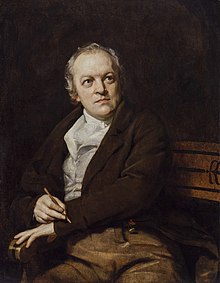
portrait
by Thomas Phillips (1807) |
|
|
|
|
Today is the birthday of William Blake (Soho, London 28 November 1757 – 12 August 1827 Charing Cross, London); poet, painter, and printmaker. In my opinion, one of the seminal figures in the history of the poetry and visual arts of the Romantic Age. His paintings and poetry have been characterised as part of the Romantic movement and as “Pre-Romantic”. Reverent of the Bible but hostile to the Church of England, Blake was influenced by the ideals and ambitions of the French and American Revolutions. The singularity of Blake’s work makes him difficult to classify.
Blake met Catherine Boucher in 1782 when he was recovering from a relationship that had culminated in a refusal of his marriage proposal. He recounted the story of his heartbreak for Catherine and her parents, after which he asked Catherine, “Do you pity me?” When she responded affirmatively, he declared, “Then I love you.” Blake married Catherine – who was five years his junior – on 18 August 1782 in St Mary’s Church, Battersea. Illiterate, Catherine signed her wedding contract with an X. Later, in addition to teaching Catherine to read and write, Blake trained her as an engraver. Throughout his life she proved an invaluable aid, helping to print his illuminated works and maintaining his spirits throughout numerous misfortunes.
Blake is sometimes considered (along with Mary Wollstonecraft and her husband William Godwin) a forerunner of the 19th-century “free love” movement, a broad reform tradition starting in the 1820s that held that marriage is slavery, and advocated the removal of all state restrictions on sexual activity such as homosexuality, prostitution, and adultery, culminating in the birth control movement of the early 20th century. Blake was critical of the marriage laws of his day, and generally railed against traditional Christian notions of chastity as a virtue. At a time of tremendous strain in his marriage, in part due to Catherine’s apparent inability to bear children, he directly advocated bringing a second wife into the house. His poetry suggests that external demands for marital fidelity reduce love to mere duty rather than authentic affection, and decries jealousy and egotism as a motive for marriage laws. Poems such as “Why should I be bound to thee, O my lovely Myrtle-tree?” and “Earth’s Answer” seem to advocate multiple sexual partners. In his poem “London” he speaks of “the Marriage-Hearse” plagued by “the youthful Harlot’s curse”, the result alternately of false Prudence and/or Harlotry. Visions of the Daughters of Albion can be read as a tribute to free love since the relationship between Bromion and Oothoon is held together only by laws and not by love. For Blake, law and love are opposed, and he castigates the “frozen marriage-bed”. In Visions, Blake writes:
Till she who burns with youth, and knows no fixed lot, is bound
In spells of law to one she loathes? and must she drag the chain
Of life in weary lust? (5.21-3, E49)
Gallery
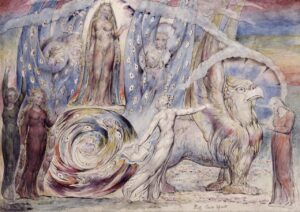
Beatrice Addressing Dante from the Car
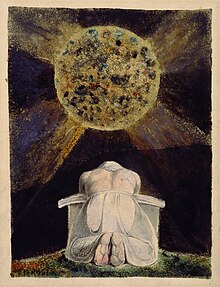



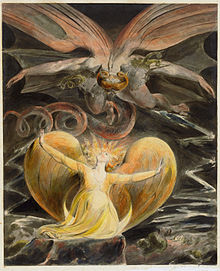

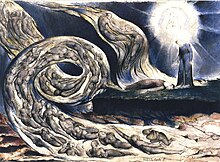
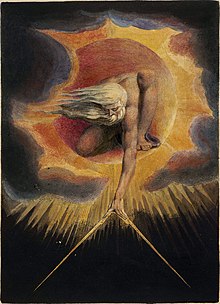
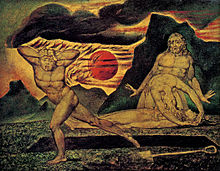
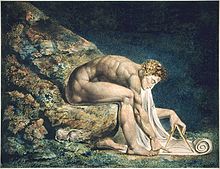


Verse
- How sweet I roamed from field to field,
And tasted all the summer’s pride,
Till I the prince of love beheld,
Who in the sunny beams did glide!- Song (How Sweet I Roamed), st. 1
- He loves to sit and hear me sing,
Then, laughing, sports and plays with me;
Then stretches out my golden wing,
And mocks my loss of liberty.- Song (How Sweet I Roamed), st. 4
- My silks and fine array,
My smiles and languished air,
By love are driv’n away;
And mournful lean Despair
Brings me yew to deck my grave:
Such end true lovers have.- Song (My Silks and Fine Arrays), st. 1
- Like a fiend in a cloud,
With howling woe,
After night I do crowd,
And with night will go;
I turn my back to the east,
From whence comforts have increased;
For light doth seize my brain
With frantic pain.- Mad Song, st. 3
- How have you left the ancient love
That bards of old enjoyed in you!
The languid strings do scarcely move!
The sound is forced, the notes are few!- To the Muses, st. 4
Poems from Blake’s Notebook (c. 1791-1792)
- Never seek to tell thy love
Love that never told can be;
For the gentle wind does move
Silently, invisibly. - I told my love, I told my love,
I told her all my heart;
Trembling, cold, in ghastly fears—
Ah, she doth depart. - Soon as she was gone from me
A traveler came by
Silently, invisibly—
Oh, was no deny.- Never Seek to Tell
- I asked a thief to steal me a peach:
He turned up his eyes.
I asked a lithe lady to lie her down:
Holy and meek, she cries. - As soon as I went
An angel came.
He winked at the thief
And smiled at the dame— - And without one word said
Had a peach from the tree,
And still as a maid
Enjoyed the lady.- I Asked a Thief
- Sleep, sleep, beauty bright,
Dreaming o’er the joys of night.
Sleep, sleep: in thy sleep
Little sorrows sit and weep.- A Cradle Song, st. 1
- Why art thou silent and invisible,
Father of Jealousy?- To Nobodaddy, st. 1
- Love to faults is always blind,
Always is to joys inclined,
Lawless, winged, and unconfined,
And breaks all chains from every mind.- Love to Faults
- The sword sung on the barren heath,
The sickle in the fruitful field;
The sword he sung a song of death,
But could not make the sickle yield.- The Sword Sung
- Abstinence sows sand all over
The ruddy limbs and flaming hair,
But desire gratified
Plants fruits of life and beauty there.- Abstinence Sows Sand
- If you trap the moment before it’s ripe,
The tears of repentance you’ll certainly wipe;
But if once you let the ripe moment go
You can never wipe off the tears of woe.- If You Trap the Moment
- Then old Nobodaddy aloft
Farted and belched and coughed,
And said, “I love hanging and drawing and quartering
Every bit as well as war and slaughtering.”- Let the Brothels of Paris, st. 2
Several Questions Answered
- He who binds to himself a joy
Does the wingèd life destroy;
But he who kisses the joy as it flies
Lives in eternity’s sunrise.- No. 1, He Who Binds
- The look of love alarms
Because ’tis filled with fire;
But the look of soft deceit
Shall win the lover’s hire.- No. 2, The Look of Love
- What is it men in women do require?
The lineaments of gratified desire.
What is it women do in men require?
The lineaments of gratified desire.- No. 4, What Is It
- You’ll quite remove the ancient curse.
- No. 5, An Ancient Proverb
Poems from Blake’s Notebook (c. 1804)
- My specter around me night and day
Like a wild beast guards my way,
My emanation far within
Weeps incessantly for my sin.- My Specter, st. 1
- And throughout all eternity
I forgive you, you forgive me.- My Specter, st. 14
Mac Tag

28/11/2017 at 1:38 am Permalink
Yes! Great stuff! Is it OK to share on Pinterest? This is
great! Keep up the terrific work!